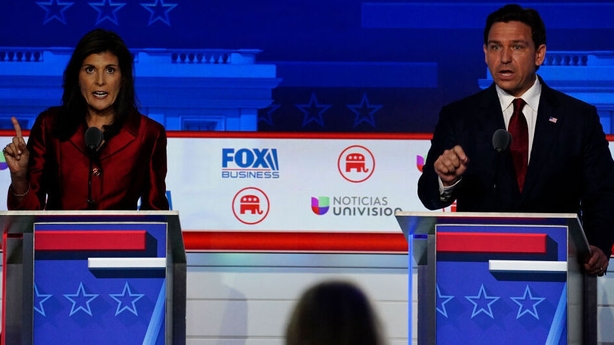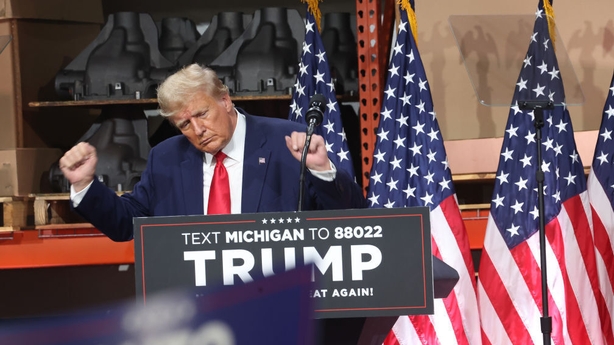Former US president Donald Trump's Republican rivals have clashed during a chaotic presidential debate levelling attacks at Mr Trump, President Joe Biden and at one another over issues from China to immigration to the economy.
But as the debate ended, none of the seven candidates on stage appeared to have secured the type of breakout moment that would alter the dynamics of a primary contest that Mr Trump has dominated for months, despite his four criminal indictments - which went virtually unmentioned during the two-hour broadcast.
Mr Trump, who led his nearest rival for the nomination by 37% in the most recent Reuters/Ipsos poll, skipped the debate, as he did the first one in Wisconsin last month.
Florida Governor Ron DeSantis used his first answer to call out the former president for being "missing in action" and for adding trillions of dollars to the national debt.
"He should be on this stage," Mr DeSantis said, drawing applause from the audience at the Ronald Reagan presidential library in Simi Valley, California. "He owes it to you to defend his record."
Mr DeSantis, whose poll numbers have declined after he was widely seen as the leading alternative to Mr Trump, has been more willing to attack the frontrunner recently after months of avoiding direct confrontation.
Former New Jersey governor Chris Christie, a frequent Trump critic, joined in, saying the ex-president was "afraid" and mocking him as "Donald Duck" for skipping the debate.
Mike Pence, vice president under Mr Trump from 2017-2021, offered a mild critique of Mr Trump's desire to centralise power in the federal government, vowing to give power back to the states.
Former US ambassador to the United Nations Nikki Haley said Mr Trump had taken the wrong approach on China by focusing exclusively on trade, rather than broader security issues.
Mr Biden, the presumptive Democratic nominee for the November 2024 election, was also a frequent target for the Republican candidates, who castigated his handling of the economy and the southern border with Mexico.

But the debating candidates, most of them mired in single digits in national polls, spent the bulk of the evening assailing one another.
As in the first debate last month, entrepreneur Vivek Ramaswamy - a political novice whose campaign for the Republican presidential nomination is his first run for public office - repeatedly drew the ire of his more experienced opponents.
"Every time, I hear you, I feel a little dumber," Ms Haley told Mr Ramaswamy after he defended joining TikTok, the Chinese-owned social media site that has raised security concerns among US officials.
Mr Ramaswamy said he uses the app to connect with young voters.
Takeaways from second 2024 Republican presidential debate
In the debate's final segment, moderator Dana Perino asserted that Mr Trump's nomination was inevitable as long as the field remained fractured among multiple candidates.
"Polls don't elect presidents, voters elect presidents," Mr DeSantis replied.
Minutes before the debate began, Mr Trump delivered a speech to workers in the battleground state of Michigan, inserting himself into a national dispute between striking workers and the country's leading vehicle makers a day after President Biden joined a union picket line.
"They're all job candidates," Mr Trump said dismissively of the seven Republicans at the debate.
"Does anybody see any VP in the group? I don't think so."

By shunning both debates, the former president signalled he was focused on Mr Biden, his once and perhaps future opponent, rather than the Republican contenders who trail badly in the polls.
The moderators did not ask the candidates about Mr Trump's legal problems.
The 77-year-old businessman-turned-politician has been indicted in four criminal cases, and on Tuesday, a New York state judge found that he committed fraud by inflating the value of his business assets.
With less than four months until Iowa's first-in-the-nation Republican nominating contest, Mr Trump's rivals are running short on time to weaken his commanding hold on the primary campaign.
The debate loomed particularly large for Mr DeSantis, whose campaign has already endured two staff shakeups as donors expressed concern about his inability to gain on Mr Trump.
Mr DeSantis made his name nationally by opposing many US government policies to prevent the spread of Covid-19.
The 45-year-old has since become a leading figure fighting what he argues are overly progressive policies favored by educators and corporations.
Ms Haley, meanwhile, was hoping a second consecutive strong debate performance would convince some Republican donors she has the best odds of unseating Mr Trump.
North Dakota Governor Doug Burgum also qualified for the debate.
Candidates focus on immigration, Mexican border
All of the candidates vowed to take a strong approach to immigration and attacked the Biden administration for failing to stem record illegal crossings at the southern border.
Mr DeSantis promised to deploy the US military against Mexican cartels, while Mr Ramaswamy said he would try to revoke birthright citizenship for the children of those who entered the country illegally.
Even when asked about the expanding US car workers' strike, Senator Tim Scott turned the subject to the border while criticising President Biden for joining the picket line on Tuesday.
"Biden should not be on the picket line," Mr Scott said.
"He should be on the southern border working to close our southern border because it is unsafe, wide open and insecure, leading to the deaths of 70,000 Americans in the last 12 months because of fentanyl."
Most of the candidates expressed support for continued aid to Ukraine, though Mr DeSantis said he would not offer a "blank cheque."
Mr Ramaswamy, who has said he would cut off assistance, warned that backing Ukraine was pushing Russia further toward China, prompting renewed criticism from his rivals that he would appease Russian President Vladimir Putin.

